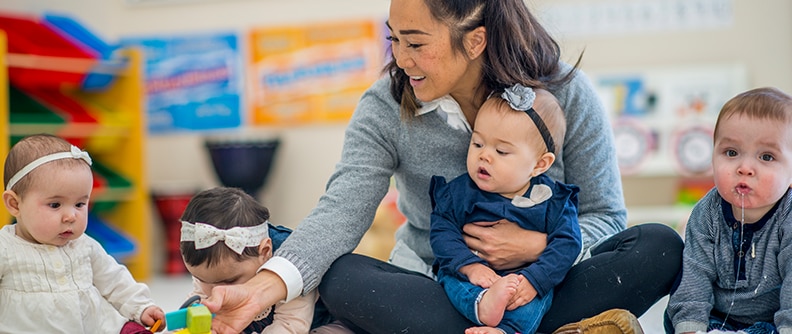Many people enroll their infants in daycare. If you’re considering childcare services for your baby, here’s what you should know.
Family, friends, and other caregivers
Many parents rely on family members, friends, or neighbors to care for their child. Others opt for a babysitter or nanny.
Relying on friends and family members can be a good option because you already know and trust the caregiver. You may prefer the flexibility in scheduling and transportation. They are often the least expensive type of care.
Remember that unlicensed childcare providers are usually exempt from the regulations that govern daycare centers. Unless they receive government financial assistance, they might not be required to meet health and safety rules or undergo any type of training. Discuss any concerns or requirements you might have for them in caring for your baby. At the very least, make sure they have first aid and CPR training.
How childcare providers are licensed is up to each state. The website ChildCare.gov has an excellent database for researching the rules and regulation in your area.
Choosing a daycare center
Daycare centers come in all shapes and sizes. It’s important to find one where you trust the staff to take care of your infant. Before you decide, ask about how the center handles illness, how much media time and outdoor play your child will get, and how often you can visit your baby throughout the day.
When choosing a daycare center, always think about:
- The center’s fees, services, and hours of operation.
- The qualifications or training of its employees.
- How you’ll communicate with staff members.
- Whether the center is licensed or accredited.
- What transportation to and from the center you’ll need.
- Whether health professionals are present every day.
- Any staffing issues the center may have.
- Any references the center provides.
According to the American Academy of Pediatrics, babies up to a year old should be in daycare groups no larger than 6. There should be one caregiver for every 3 babies.
What to know about illnesses
It’s true that kids in daycare get sick more often than those who stay at home. Other kids expose yours to germs, making it more likely they’ll catch a cold or another illness.
If you have the choice, enroll your baby in a daycare that doesn’t have too many other children. This can help cut down on your child’s exposure to germs, especially during their first winter.
Overcoming common breastfeeding barriers
If you enroll your infant in daycare while you are still breastfeeding, you will want to check that the facility has proper refrigeration for the pumped breast milk you will provide.
Remember to store breast milk only in approved containers. Don’t use regular bottle liners or resealable bags. You can also store milk in plastic or glass bottles. These containers should be washed in warm, soapy water and rinsed well.
Discuss your baby’s feeding schedule with the daycare center staff and be sure you are comfortable with their policies for feeding the infants in their care.
